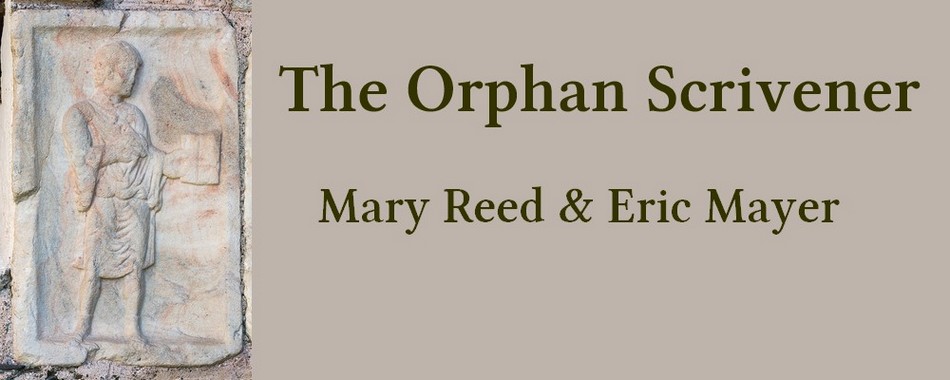ERIC'S BIT or WRITING ABOUT WRITING
One of the problems with co-authoring books is that sometimes I feel obliged to write about writing. It is, after all, a favorite pastime of authors, judging by the endless blogs and websites and instructional books devoted to writing advice. And surely all this verbiage would not exist if readers did not want to read about how to construct a novel or how to get published.
Unfortunately I've never cared for writing about writing. It is quite possibly because I have no idea what I'm doing at the keyboard -- I've just been winging it -- and thus have nothing useful to impart. But it strikes me that most of what authors say about their art is either self obvious or pure b.s..
To me, writing is not a mechanical process. Ideas are far more important than techniques. Everything you need to know about technique you can find in Strunk and White's Elements of Style, and you probably know most of what's in that little book already.
Picasso once famously remarked that when artists got together they talked about turpentine. But writing, unlike painting, is not a physical medium. Writers don't even have turpentine to discuss. Writers are dealing purely with communication, mind to mind by way of symbols which can be as insubstantial as pixels on a computer screen. Printers might debate inks but it has nothing to do with writing.
Writers can of course describe how they go about their own writing and their personal tastes but how helpful is that? After I read Elmore Leonard laying down his law that books could not ever begin with the weather I glanced at a dozen classic novels at random and noticed that half of them began with the weather.
What is important in writing, in my opinion, is the writer's idiosyncratic imagination. If you are employing someone else's ideas rather than your own ideas, you are not doing anything worthwhile and what are the chances that your original ideas can be conveyed by the techniques someone else uses to convey his or her quite different ideas?
Yes, copying ideas does seem to work so far as publication is concerned. Did so many writers really all decide, practically at once, to start writing about vampires? (Mary and I have joked that we are going to kill off Theodora and then continue the series as She Vampire of Byzantium!) But even there, I would argue, the successful writers are those who bring their own vision to the general concept.
True, if writing is mainly ideas then it can't be taught, because you can't teach anyone to have ideas. But most of us do have ideas and reading too much about writing and the publishing industry can prevent us from noticing that! I believe it is dangerous to pay too much attention to what other writers say about techniques and marketing. It is too easy to obscure one's own ideas -- or to lose track of them entirely -- in fretting over or trying to employ techniques and marketing schemes of others.
What is the basic appeal of writing? We all like to hear stories, don't we? It's a human trait. Even people who don't enjoy reading want to see stories via television or movies. We are also interested in those other people with whom we share the world, who are so much like us but not exactly, who see the world in their own way, and whose stories reflect that.
You can describe techniques, and how to get published, or how to please the critics or this group of readers or that group. There is so much to write about writing. But to me, the only advice that ultimately counts is this.
Tell your own story.
AND FINALLY
Ambrose Bierce reckoned cursing someone was the equivalent of energetically belaboring them with a verbal stick. Invective does not have to be spoken, and our own inscrutable (we hope, or else readers are ahead of the plot) reasons we've featured curse tablets, those wonderfully inventive linguistic creations, more than once in our fiction, both in the short or long forms.
We mention this because the next issue of Orphan Scrivener will grace subscribers' in-boxes on April 15th -- a day on which many US residents are usually found hunched over their yellow legal tablets racing to finish last-minute calculations for their tax return forms both long and short. This year, due to a federal holiday intervening, the IRS has pushed the evil day back to 18th April, so whereas we'll take it as read even the most genteel may feel compelled to utter a curse or two as the due date approaches, if we hear any ripe language on the 15th we'll try not to assume it's directed at the editors of Orphan Scrivener.
See you then!
Mary R and Eric
who invite you to visit their home page, hanging out on the virtual washing line that is the web at http://home.earthlink.net/~maywrite/ There you'll discover the usual suspects, including more personal essays, lists of author freebies and mystery-related newsletters, Doom Cat (an interactive game written by Eric), and our growing pages of links to free e-texts of classic and Golden Age mysteries, ghost stories, and tales of the supernatural. There's also an Orphan Scrivener archive, so don't say you weren't warned! Intrepid subscribers may also wish to pop over to Eric's blog at http://www.journalscape.com/ericmayer/
